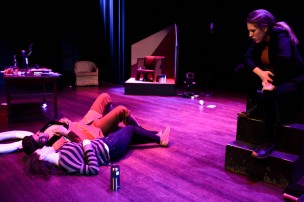Othello's green-eyed monster lurks backstage in this complete retelling of Shakespeare's classic.
Love, lust, jealousy, betrayal, and despair: These topics and themes are great fodder for the stage. However, as adapter and director Coz Deicke ’15 and the cast and crew of “Othello” know, they are just as prevalent while rehearsing for a show as they are in their production itself.
In this new, ambitious take on “Othello,” as Deicke staged it, the entirety of the action takes place during the rehearsal of a show. Othello (Rose Beth Johnson-Brown ’18) is a hotshot director who unwittingly inspires one of her actors, the calculating, manipulative Iago (Vikrant Sunderlal Chandel ’15), to try to destroy her when she shuns him and casts Cassio (Sarah Corey ’15) as the lead in his stead. Iago sets in motion a plan to convince Othello that her stage manager and wife Desdemona (Louisa Ballhaus ’16) is less than faithful.
While the story begins and ends in the same place as Shakespeare’s original play does, the adaptation changes just about everything else. Moving the entire show backstage places an emphasis on performance, both of the actors and of their characters. The script, too, is elusive and unpredictable. Shakespeare’s language is kept intact in some places and replaced with colloquialisms in others, switching back and forth with precision and without warning.
“Many Shakespeare adaptations I’ve seen are either incomprehensible to people who don’t know Shakespeare or invite a comparison to the really great Shakespeare work that theater people have seen,” Deicke said. “There’s so much more opportunity for exploration, adaptation, and transformation.”
And transform he does. Deicke’s script is experimental and flamboyant, with a “chorus” of three actors (Conor Boughton ’15, Alexandra Stovicek ’17, and Amelie Clemot ’18) excellently portraying all of the supporting characters. Every scene brings something intense and unexpected, be it a performance decision, a change in lighting, sound, or something way too fun to reveal here.
“It’s very heightened in a way that I’m really excited about,” Deicke said. “Everyone is real in a way, but they’re all pushed to an extreme.”
Not only does the script play with theatricality, but there is also an element of gender politics. Whereas the central marriage of Shakespeare’s original play is one of mixed race—Othello is a Moor, while Desdemona is Venetian—this adaptation of “Othello” has the titular character and Desdemona in a lesbian marriage, one portrayed with sweet flirtation, fiery anger, and everything in between by Johnson-Brown and Ballhaus.
“[Deicke] tried to have it not be called ‘Othello,’ and we all yelled at him and told him nobody would know what they were seeing,” Ballhaus said.
Nevertheless, the show is still quite a departure. Until a few days ago, the entire show ran almost three hours without intermission, but on Monday, Deicke decided the show needed to be cut in half. Cut down from a 70-page to a 35-page script, “Othello” now runs at a svelte, engaging one hour and 15 minutes.
“The process has been kind of crazy,” said Catherine Green ’17, the show’s stage manager. “And I don’t mean that as a bad thing.”
Chopping off half a show is certainly a strenuous process, but the cast and crew were game and are now ready to perform.
“It seems so impossible, but I decided you can either go to the highest point of the sinking ship or you can start working on the raft,” Deicke said.
The extensive commentary of “Othello” on backstage politics, control, love, misogyny, gender, performance, and insecurity could not be sold without the exceptionally strong performances of its cast. Newcomer Johnson-Brown is definitely a talent to watch, portraying a woman trying to keep her world in control while plagued with self-doubt, slowly descending into the latter when the former gives way.
Chandel plays one of Shakespeare’s most vile monsters with an interesting smoothness, magnetic without ever going over-the-top. Ballhaus and Corey both combine desperation and fear with a sense of wit that adds a measure of levity to even the production’s most dire scenes. And Boughton, Stovicek, and Clemot make some of the adaptation’s most complex, challenging material seem effortless and infinitely watchable.
This is a bold, ballsy adaptation, where material comes from inside and outside the script in equal measure; where the language, relationships, and performance are linked in intriguing ways; where dozens, maybe hundreds, of props, costumes, and lighting changes are implemented; and where the world is heightened, magical, and infinitely strange.
In the ’92 Theater this Thursday, Friday, and Saturday at 8 p.m., “Othello” will make something brand new out of an old classic.
